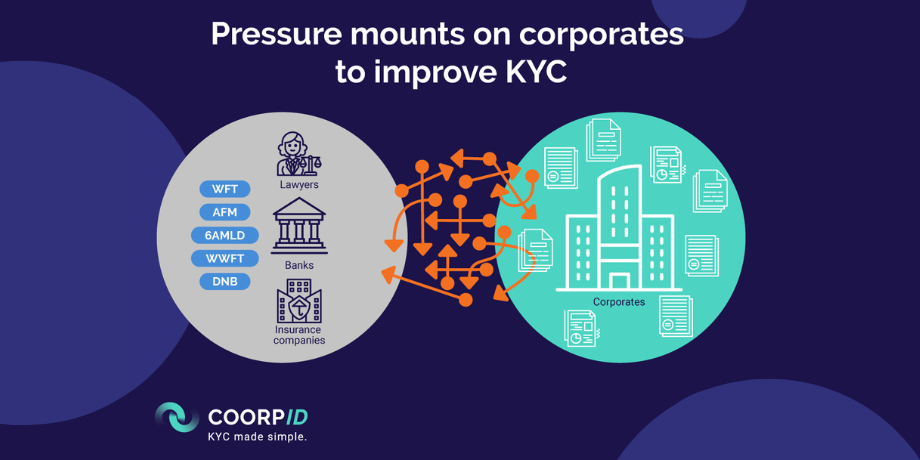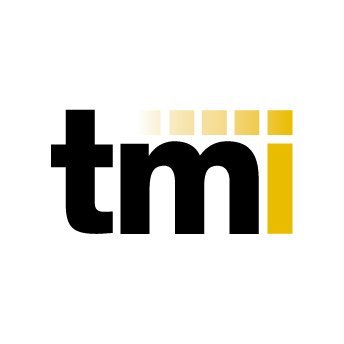As any corporate treasurer understands, Know Your Customer (KYC) checks are a necessary evil if you want to do business. But the process of providing KYC-related documents to banking partners continues to become increasingly complex, time-consuming, and difficult to manage. Meanwhile, the pressure on treasury teams to satisfy these requests quickly, and at regular intervals, is also intensifying.
Money laundering and terrorist financing threats continue to increase, causing authorities to step up the pressure on gatekeepers such as financial institutions (FIs). Consequently, FIs are required to implement extremely stringent KYC procedures which, in turn, result in an increasingly onerous KYC burden for their corporate clients. In the latest Dutch Association of Corporate Treasurers (DACT) Treasury Barometer survey1 more than half of the respondents said that rapid digitisation in the industry meant the risk of increased fraud was high (38%) or extremely high (20%).
Current KYC approaches tend to be based on delivering various company documents to each banking partner in a disjointed, ad hoc manner. Each piece of documentation must be sent out multiple times, typically by email. There is no oversight on what is exactly needed and when, which often means that front office staff are reacting to chaser emails from the partner bank and searching for the right colleague to fulfil a document request on the hop.
Regulators pile on the pressure
The good news is that the technology to support KYC requirements is becoming more readily available to corporates and not just to their banking partners. The bad news is that the technologies and techniques employed by financial criminals are also becoming increasingly sophisticated. Money laundering is an ever-growing and evolving problem – in the same way that new instruments, such as cryptocurrencies, open up the financial system, new threats are also emerging in tandem, prompting authorities around the world to further tighten regulations.
In the European Union, these regulations are issued in the form of anti-money laundering (AML) directives. Banks and financial institutions have had to adapt quickly to these changing regulations, with two directives (AMLD5 and AMLD6) added in 2020 alone. Each directive expanded the scope of the previous directive, reflecting both the changing technological landscape and extending the coverage. The onus then rests on the corporate client to provide all of this information. To add to the complexity, regulations differ in different jurisdictions – and even between EU states – so multi-national corporates will feel added pressure.

How a central repository can help
Central repositories, such as CoorpID, provide a single collaborative platform that allows you to manage all your KYC requests from one location. Document exchange takes place through a digital vault for collecting, storing, and sharing corporate documentation. This means that instead of sending out documents multiple times to different banking partners via unsecure email chains, you need only to upload KYC documents once and any updates can be made unilaterally. Instead of every document exchange coming with a significant amount of risk, company documents are shared using strong authentication and encryption.
Industry collaboration is vital in overcoming (KYC) challenges. Having a secure KYC tool in place enables corporates and their banking partners to work together on their KYC process. Using the same platform means both internal teams and external partners know what is needed and why, so any documents can immediately be shared with the right contact. Internal workflows are improved significantly, with tasks delegated to appropriate colleagues, direct feedback on documents, and automatic alerts for any missing documents.
This allows you to fulfil another key demand for today’s KYC processes – perpetual KYC. While KYC has traditionally been conducted in periodic reviews – allowing a significant window of opportunity for change – banks are increasingly looking to track and monitor their clients continuously. Through controlled access, a shared solution allows your banking partners to collect, organise, and track all your relevant documents so that documents are readily accessible when they are needed. Meanwhile, you, the corporate, always retain absolute control over your sensitive documents. Audit functionality makes it easy to monitor any changes made within a particular KYC tool, providing an added layer of transparency.
Smart tools also allow corporates to create and manage organisation charts and identify individuals who own and control the firm, another important feature given regulators’ increased focus on ultimate beneficial owners.
A win-win
Using a centralised solution means information requests from your banking partners are kept to a minimum because everyone has access to the right data. Your organisation can proactively manage its KYC requirements instead of reacting on an ad hoc basis. With friction – and associated costs – reduced for both parties, focus can return to maintaining a productive business relationship and achieving your core business goals.
At CoorpID, we have created a solution that simplifies and speeds up the KYC process for corporates and their banking partners. Our digital vault allows organisations to safely store all their corporate documents in one place and share them easily with multiple financial institutions. With our platform, you can be sure that you are fulfilling bank requests in a compliant and timely manner without unduly impacting the operational efficiency of your treasury team.
With market-leading financial institution ING as our parent company, we offer a solution that has been carefully co-developed with a broad portfolio of corporates across Europe and complies with the highest bank-grade security standards. Although it is an ING initiative, CoorpID’s KYC platform also benefits from being completely independent so users can share collected information with other banks, or any other business partner, even if they are not on the system.
Start reducing KYC-related pressure on your teams today – book a demo
Footnote:
1The DACT Treasury Barometer is an independent survey for and by treasurers. Developed jointly by the Dutch Association of Corporate Treasurers (DACT), Rabobank and Enigma Consulting, it presents the latest trends and developments in the corporate treasury landscape. The full 2021 report can be viewed here: https://www.treasurybarometer.nl/


